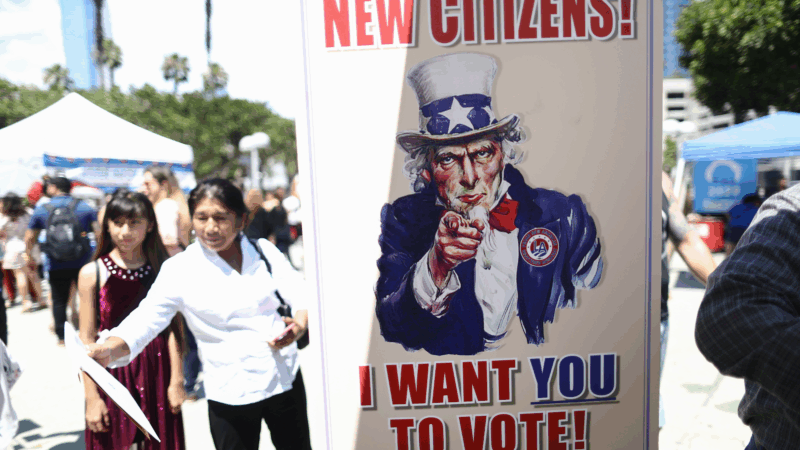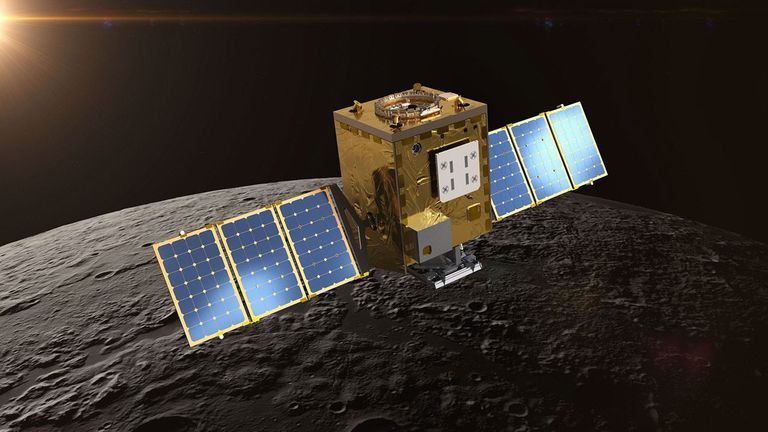Trump administration blocks groups from voter registration at naturalization events
Nongovernmental groups are now barred from registering new voters at naturalization ceremonies, the U.S. Citizenship and Immigration Services has announced.
The policy, which was issued Friday, says “that only state and local election officials will be permitted to offer voter registration services at the end of administrative naturalization ceremonies.”
Groups like the League of Women Voters criticized the decision. They often partner with local and state election officials or supplement their work to administer registration services — and that includes during naturalization ceremonies.
Celina Stewart, CEO of the League of Women Voters, said in a statement that this new policy “is an attempt to keep new citizens from accessing their full rights.”
“For decades, the League of Women Voters has been a trusted partner of both USCIS and federal courts to register new voters at naturalization ceremonies,” she said. “This work has resulted in hundreds of thousands of new citizens registering to vote with League volunteers across the country.”
USCIS wrote in the policy memo that the use of nongovernmental organizations for voter registration at naturalization ceremonies “was sporadic and varied based upon the location.” USCIS also claimed that ensuring the groups are nonpartisan was a “burden” on the agency.
“Given USCIS does not primarily rely on nongovernment organizations for voter registration services, and the administrative burden on USCIS to ensure that those nongovernmental organizations who provide voter registration services are nonpartisan,” the agency is blocking them from USCIS facilities.
“This change in no way impacts new citizens’ access to information and applications to register to vote,” the agency adds, “as this information will continue to be provided by state or local election officials, or USCIS staff at the end of naturalization ceremonies.”
Several Republican-led states have in recent years enacted new laws to crack down on registration drives conducted by third-party groups. Some organizations have shut down their efforts in the face of prohibitively high financial and criminal penalties. Third-party organizations often find more success registering communities of color – particularly immigrant communities — than political parties or government officials.
Steward said that this recent exclusion is simply part of the administration’s larger effort to intimidate immigrants.
“By shutting out the League and other civic partners, USCIS is making it harder for new citizens to register to vote, which is yet another intimidation tactic and attack on the immigrant community,” she said. “Our democracy is stronger with the voices of new citizens.”
Deadline looms as Anthropic rejects Pentagon demands it remove AI safeguards
The Defense Department has been feuding with Anthropic over military uses of its artificial intelligence tools. At stake are hundreds of millions of dollars in contracts and access to some of the most advanced AI on the planet.
Hillary Clinton calls House Oversight questioning ‘repetitive’ in 6 hour deposition
In more than seven hours behind closed doors, former Secretary of State Hillary Clinton answered questions from the House Oversight Committee as it investigates Jeffrey Epstein.
Chicagoans pay respects to Jesse Jackson as cross-country memorial services begin
Memorial services for the Rev. Jesse Jackson Sr. to honor his long civil rights legacy begin in Chicago. Events will also take place in Washington, D.C., and South Carolina, where he was born and began his activism.
In reversal, Warner Bros. jilts Netflix for Paramount
Warner Bros. says Paramount's sweetened bid to buy the whole company is "superior" to an $83 billion deal it struck with Netflix for just its streaming services, studios, and intellectual property.
Trump’s ballroom project can continue for now, court says
A US District Judge denied a preservation group's effort to put a pause on construction
NASA lost a lunar spacecraft one day after launch. A new report details what went wrong
Why did a $72 million mission to study water on the moon fail so soon after launch? A new NASA report has the answer.







